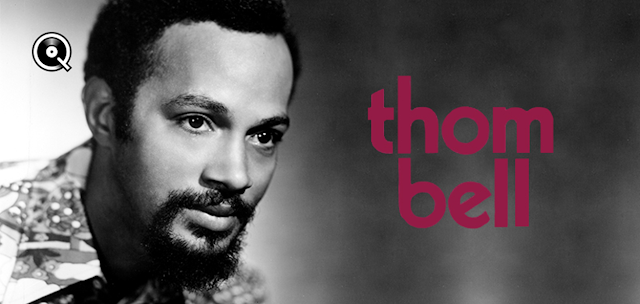THOM BELL: I HEAR A SYMPHONY
With Thom Bell's passing, another major player of the Philadelphia Soul family is gone. Having left an earthly footprint for eternity---I envision Bell ascending to an ancestral plane, reuniting with his departed comrades. His signature strings, French horns, sitars, and oboes trumpet his arrival.
My early memories of the legendary producer/arranger/singer/songwriter were ignited by his peculiar-looking first name---Thom: a cross between a West Indian spelling and an antiquated abbreviation of his birth name. (For years I called him Th-om as in the word “thumb”). I remember my mother's recollection of my little sister’s infatuation with "Rock and Roll Baby"----a Bell-produced joyful romp about a precocious child prodigy from “Bluefield, West Virginia” in "doodle-white shoes" who "never sang out of tune."
Even as a seven-year-old in 1976, I was keenly aware of Bell's music. As a second grader, I proudly recited (to say I sang it would be a stretch) "The Rubberband Man" word-for-word. During the late 60s and throughout the 1970s, Bell's symphonic soliloquies were in heavy rotation on pop, R&B, and easy-listening playlists.
Working with diverse acts from Johnny Mathis, Ronnie Dyson, and Phyllis Hyman to Elton John and James Ingram----Bell is most known for the Delfonics’ muted pageantry ("Didn’t I Blow Your Mind (This Time"), the Stylistics’ wistful romance ("You Make Me Feel Brand New"), and the Spinners’ earthy folksiness ("Ghetto Child").
Bell’s music had reach. I can remember a 1976 Good Times episode ("JJ's New Career") where Jimmie Walker's JJ falls in with a couple of drug-dealing friends to rescue his family from eviction. In a scene depicting him momentarily enjoying the high life in a posh apartment partying with foxy ladies---one of his crew asks him: "where's the latest Spinners album?"
Like aural heirlooms, Bell's work would be passed down to Gen-Xers, Millennials, and Generation Z in the form of CDs, TV commercials, hip-hop & R&B samples, dusty record collections, and Spotify playlists.
In 2022---we know the music, but few know the elusive figure left off countless top-five producer lists by fans oblivious to Black music's creative continuum or so-called music connoisseurs whose historic reach only goes back past late-70s/early 80s Quincy Jones.
Bell was a lesson in perfect contrast---he was classically trained and musically self-taught. He was a high school dropout with a prodigious musical mind that was almost collegiate. Deftly avoiding contractual webs, he was content with being an independent work-for-hire yet he'd enjoy fruitful collaborations with lyricists William Hart, Linda Creed, and the writing team of Jefferson-Hawes-Simmons.
A model of controlled restraint in the studio, Bell stepped out of the box to work with fading acts (Dionne Warwick and the Spinners) and returned them to glory.
Despite earning hefty sums for his work, Bell eschewed the flashy trappings of fame. Instead of parties and huge entourages, it was weekends at home playing ping pong or cleaning tanks that housed his beloved exotic fish. During a prolific partnership that ran the course of thirty-plus songs and over 40 gold and platinum records, Bell and his partner Creed pursued regular lives away from the music.
At the height of their fame, Creed sat for an interview explaining Bell's desire to be an anti-star: "Tommy and I have turned down several TV shows because he takes the bus to work every morning and says how can take the bus to work if people know who I am? They'll never leave me alone."
When George Clinton ("You know, violins, big productions, disco, the Teddy Pendergrasses, it all sounds like white pop music of the 50s. A lot of it is cool, but it's still just a rehash of what white America did....") and Maurice White---men born during Bell’s birth decade---shed the accouterments of their buttoned-up musical past to erect their P-Funk and Earth, Wind & Fire franchises, Bell stayed the course, riding his symphonic soul to major success. He'd win the first-ever Grammy for producer of the year in 1975, beating out Stevie Wonder in his hitmaking prime.
Bell's supreme confidence ('' don't bring them to me unless they've got bombs. that's my job, to keep you from getting bombs") wit, and practicality saw him avoid the nasty pitfalls of the music industry. In the business but not of it---Bell's lucrative publishing revenue allowed him to retreat to a quiet life in the hinterlands of Washington State.
Less known than his comrades Gamble and Huff---Bell was a major part of the Mighty Three. Creatively and business-wise they split divergent hairs but they were unified in advancing Black music beyond soul's throaty bluster and funk's sinewy syncopation. While Gamble and Huff saved souls, Bell soothed them.
As the bells toll in the wake of Thom Bell's earthly transition, the poignant words of writer David Mutti Clark come to mind: the music echoes in the emptiness. It reminds us of where came from and where we’re bound.




Comments
Post a Comment